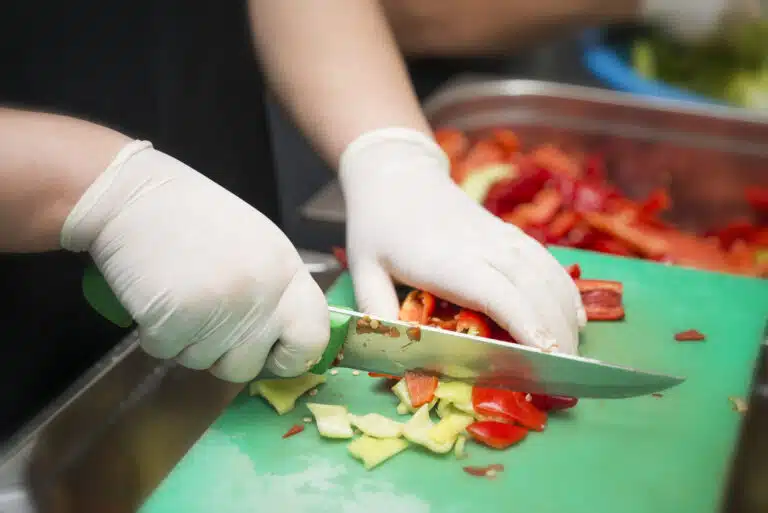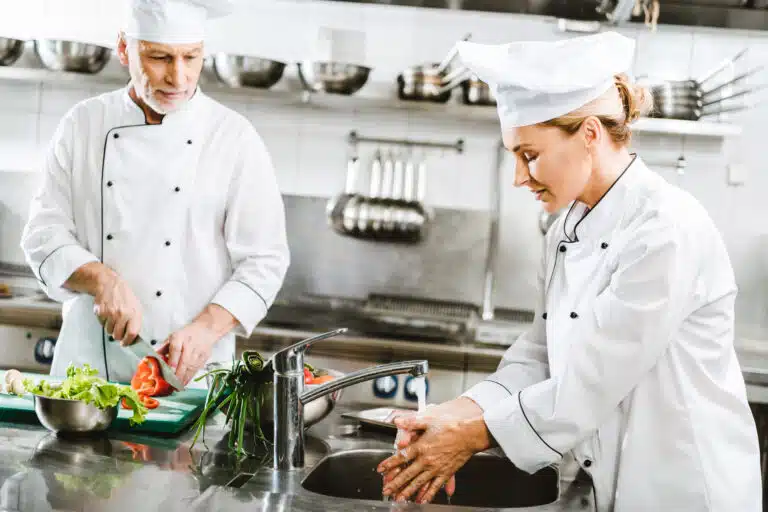Landing a job in food safety requires not just technical knowledge but also the ability to demonstrate your expertise during an interview. Whether you’re applying for roles like food safety officer, inspector, or manager, interviewers will test your understanding of regulations, hazard prevention, and real-world application. In this comprehensive guide, we’ll cover the most common food safety interview questions for 2025, categorised by type, along with expert tips and sample answers to help you stand out. We’ve drawn from industry standards and recent updates to ensure you’re prepared for evolving challenges like new allergen guidelines and sustainability-focused safety practices.
By mastering these questions, you’ll show employers you’re detail-oriented, proactive, and committed to protecting public health. Plus, completing accredited courses—like Food Hygiene Level 2 or HACCP Level 3—can give you a competitive edge and real examples to reference in your responses.

Why Prepare for Food Safety Interview Questions?
Food safety roles are critical in preventing foodborne illnesses, which affect millions annually. Interviewers want to see your grasp of key concepts like HACCP, cross-contamination prevention, and regulatory compliance (e.g., FDA, FSMA). Preparation helps you answer confidently, using the STAR method (Situation, Task, Action, Result) for behavioural questions. Aim to incorporate keywords like “food safety protocols,” “HACCP principles,” and “allergen management” naturally to align with job descriptions.
General Food Safety Interview Questions
These questions assess your baseline knowledge and motivation. They’re often asked early to gauge fit.
| Question | Why It’s Asked | Sample Answer |
|---|---|---|
| What motivated you to pursue a career in food safety? | To understand your passion and long-term commitment. | “I’ve always been passionate about public health, especially after witnessing a foodborne outbreak in my community. Pursuing certifications like Food Hygiene Level 2 solidified my interest, as I enjoy ensuring compliance with UK regulations to protect consumers.” |
| What are the four main types of food hazards? | Tests foundational knowledge. | “The four types are biological (e.g., bacteria like Salmonella), chemical (e.g., pesticides), physical (e.g., glass fragments), and allergenic (e.g., peanuts). Preventing them involves HACCP and proper labeling.” |
| Explain the ‘Danger Zone’ for temperature control. | Checks understanding of bacterial growth risks. | “The Danger Zone is 4°C to 60°C, where bacteria multiply rapidly. I always ensure foods are kept below 4°C or above 60°C, using thermometers for verification.” |
| How do you stay updated on food safety regulations? | Evaluates your proactive learning. | “The four types are biological (e.g., bacteria like Salmonella), chemical (e.g., pesticides), physical (e.g., glass fragments), and allergenic (e.g., peanuts). Preventing them involves HACCP and proper labelling.” |
| What qualities should a food safety professional have? | Assesses self-awareness and industry insight. | “Detail-oriented, communicative, and adaptable. For instance, being thorough in audits prevents outbreaks, while communication ensures team compliance.” |
Questions About Experience and Background
These delve into your practical skills and past roles. Use specific examples to highlight achievements.
| Question | Why It’s Asked | Sample Answer |
|---|---|---|
| What field experience do you have in food safety? | To verify hands-on expertise. | “In my last role at a processing plant, I conducted daily HACCP audits, reducing contamination risks by 30% through improved sanitation protocols.” |
| Share a time you explained a food safety system to someone unfamiliar with it. | Tests communication skills. | “I trained new hires on HACCP by breaking it into seven principles, using visuals. This led to 100% compliance in our next inspection.” |
| What information should food rotation labels contain? | Assesses knowledge of storage best practices. | “Labels should include the item name, preparation date, use-by date, and storage instructions to prevent spoilage and ensure FIFO (First In, First Out).” |
| If you cut yourself while preparing food, what would you do? | Evaluates immediate response protocols. | Test communication skills. |
| What special skills or tools do you bring to this position? | Highlights unique value. | “I’m certified in ROSPA and use digital tools like temperature logging apps for real-time monitoring, which improved efficiency in my previous audits.” |
In-Depth Food Safety Interview Questions
These probe technical depth and problem-solving. Reference regulations like FSMA or UK standards.
| Question | Why It’s Asked | Sample Answer |
|---|---|---|
| Describe HACCP and its significance. | “HACCP is a preventive system identifies hazards at critical control points. It’s vital for minimising risks, as seen in my implementation that cut recalls by 40%.” | Core to food safety, tests understanding. |
| How do you prevent cross-contamination? | Key to avoiding outbreaks. | “HACCP is a preventive system that identifies hazards at critical control points. It’s vital for minimising risks, as seen in my implementation that cut recalls by 40%.” |
| What process do you use to inspect meat processing plants? | Specific to high-risk areas. | “Use colour-coded boards, separate raw/cooked areas, and enforce hand hygiene. In one audit, this reduced bacterial incidents by 25%.” |
| Explain how to handle a foodborne illness outbreak. | Assesses crisis management. | “Isolate affected products, notify authorities, trace sources via traceability systems, and communicate transparently. This approach contained an E. coli scare in my last role.” |
| “Follow the top 14 allergens per UK law, ensure clear bolding, and train staff. I updated labels in a prior job, reducing complaints by 50%.” | Focuses on growing regulatory emphasis. | “I follow USDA guidelines: check temperatures, sanitation, and labelling. Recently, I identified a labeling error, preventing a potential allergen issue.” |
Sample Food Safety Interview Questions with Answers (Behavioural Focus)
Use STAR for these to showcase experiences. We’ve expanded to 10 samples for deeper prep.
- How do you prioritise tasks on a busy day?
“I start with high-risk inspections like temperature checks, then staff questions, optimising routes for efficiency. This ensured thorough compliance during peak seasons.” - Share an experience where attention to detail solved a problem.
“Noticed inconsistent poultry handling; implemented glove protocols, preventing bacterial spread and passing a surprise audit.” - How have you improved your food safety knowledge recently?
“Completed a 2025-updated HACCP Level 3 course, adopting AI monitoring tools for better inspections.” - How do you advise teams on new equipment?
“Via emails, demos, and in-person visits, relating benefits to their operations—like safer poultry processing tech.” - How did you get started in food safety?
“From a cafe job lacking training, I self-certified in Food Hygiene Level 2, advancing to supervisory roles.” - Describe methods for writing compliance reports.
“Use structured templates with evidence, recommendations, and timelines. This streamlined enforcement in my audits.” - What system do you use for plant quarantines?
“Assess risks, isolate items, treat or destroy per regulations, documenting for traceability.” - How do you handle raw foods with bacterial risks?
“Separate tools, cook to 75°C, and monitor with logs—reducing Salmonella risks in poultry handling.” - What are common sources of foodborne illnesses?
“Undercooked meat, contaminated water, cross-contamination. Prevention via pasteurisation and hygiene.” - How do you ensure personal hygiene in food service?
“Enforce 20-second handwashing, hairnets, and illness reporting—key to preventing contamination.”
Tips for Acing Your Food Safety Job Interview in 2025
- Research the Company: Know their products and recent recalls.
- Practice STAR: Rehearse with a mirror or friend.
- Highlight Certifications: Mention CPD-accredited courses like those from Skilltopia.
- Ask Questions: Inquire about their HACCP updates or training programs.
- Dress Professionally: Opt for business casual.
Preparing with these questions will boost your confidence and rankings in searches for “food safety interview questions 2025.” Remember, roles demand ongoing learning—consider enrolling in online courses to stay certified.
Ready to level up? Explore Skilltopia’s accredited Food Hygiene and HACCP courses for hands-on knowledge that shines in interviews. Start today and secure your future in food safety!






